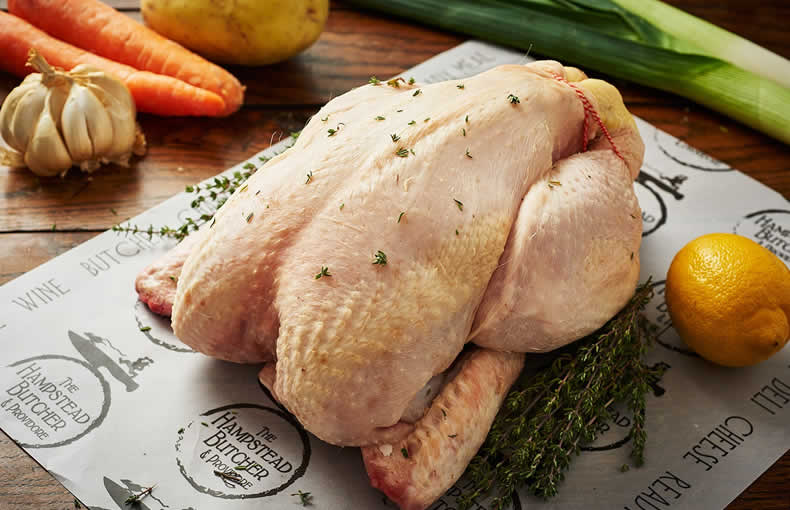There's Chicken, And There's Our Chicken
Our free-range chickens come from three sources.
Free Range Herb Fed Chickens from the pastures at the foot of the Hambleton Hills in North Yorkshire, a small batch of day-old chickens arrives on the farm each week, straight from the hatchery just a few miles up the road. These chicks go into a sectioned off area into brooding sheds where they are kept warm by gas heaters or ‘brooders’ for up to 3 weeks at which point they come off the heat as they have developed feathers to keep themselves warm.
Having had a week to get use to the temperature change, the chickens at 4 weeks old are moved from the brooding shed to a mobile outside shelter where they are truly free range having constant access to a grass paddock to enjoy the outdoor environment. During this period, they are able to make use of their natural instincts; being able to peck at the grass, find and eat insects, dust bathe and soak up the sunshine.
They are fed on locally produced chicken feed that is a corn based diet free from growth promoters and drugs. Whole corn is mixed in with the feed to give the birds a healthy cover of fat that helps it stay moist once cooked and adds to the flavor of the meat.
From 3 weeks old, fresh herbs are introduced into the chicken’s diet with the use of custom made miniature hay racks. The herbs are a mixture including basil, chives, dill, coriander and various salads to name just a few but their absolute favorite is rocket! They don’t like is sage!! All the herbs are trimmings or have simply gone past their best and are a by product that would have otherwise ended up on a compost heap.
By 8 weeks old the chickens will eat up to a kilogram of fresh herbs each week. Furthermore, the herbs give additional nutrients to the chicken’s diet other than a standard formulated diet and pecking through them keeps them occupied resulting in a happy and extremely healthy bird.
Our Packington free range Chickens from Blakenhall Park in Staffordshire. They are housed in small sheds, with plenty of warm bedding, heating, and good ventilation, fed on maize and omega 3 enriched diets, which adds a creamy colour to the birds and enhances the flavour. The omega 3 further increases the birds welfare and the birds are free from any growth promoters or antibiotics. The birds roam free during the day on established English pastures consisting of various grasses and clovers, in the evening they must be brought in to protect them from night time predators such as foxes.
Sutton Hoo Free Range Chickens are a traditional slow growing breed. The birds roam freely on 40 acres of pasture overlooking the River Deben. They live in small groups and shelter from the elements in mobile houses that have no artificial lighting and are naturally ventilated. Their playground is the tussocky grassland at Sutton Hoo. From about two weeks of age the chicks venture outside to enjoy exploring under Suffolk’s vast open skies. From then on all feeding takes place outside by hand with additional nutrients foraged from the surrounding vegetation.
Label Anglais Chickens come from farms in Dorset and Wiltshire where the method is influenced by the very successful methods set-up by grass root farmers in France, back in the 1960’s. They called it Label Rouge Poultry and it was an approach to farming that used traditional free-range production methods, respected animal welfare and protected the environment.
Today, our supplier here uses a new farming technique called Brood and Move to keep the birds' environment super clean so that they remain healthy and with no need for antibiotics; a huge benefit for the bird’s wellbeing and one that delivers a superior quality of meat.
For every new brood they are be kept in their small same age groups, in large shaded, grassy areas throughout their lives. They enjoy a wholesome and delicious diet of whole maize and oats that travel all the way from our neighbouring farm – right next door! This is a hugely important part of this farming method, not only for the nutritional benefit of the birds, but also in supporting the local farming community and environment.
The chickens enjoy a 100% plant based diet, free from artificial sugars and only supplemented by pea protein. At 7 weeks whole apples are added to the diet for the chickens to peck at.

